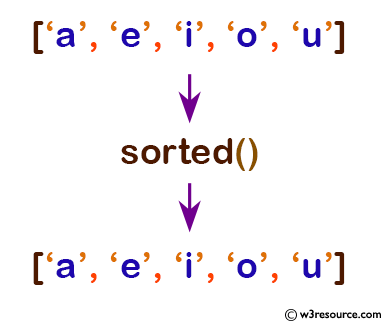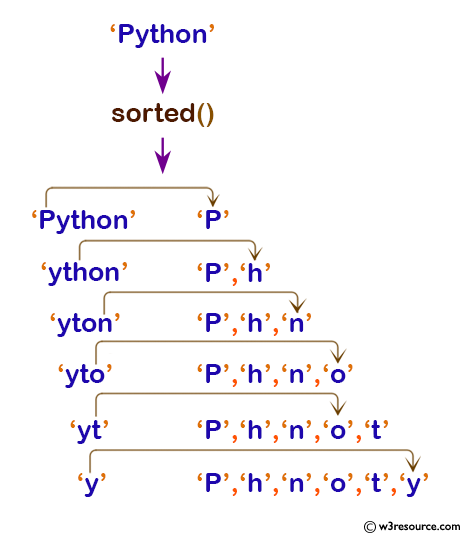Python: sorted() function
sorted() function
The sorted() function is used to get a new sorted list from the items in iterable.
Version:
(Python 3.2.5)
Syntax:
sorted(iterable[, key][, reverse])
Parameter:
| Name | Description | Required / Optional |
|---|---|---|
| iterable | The sequence to sort list, dictionary, tuple or collection etc. |
Required. |
| key | A function that serves as a key for the sort comparison. | Optional. |
| reverse | True will sort descending and default is False | Optional. |
Return value:
A sorted list from the given iterable.
Example-1: Python sorted() function
# vowels list
pyList = ['a', 'e', 'i', 'o', 'u']
print(sorted(pyList))
# string
pyStr = 'Python'
print(sorted(pyStr))
# vowels tuple
pyTuple = ('a', 'e', 'i', 'o', 'u')
print(sorted(pyTuple))
Output:
['a', 'e', 'i', 'o', 'u'] ['P', 'h', 'n', 'o', 't', 'y'] ['a', 'e', 'i', 'o', 'u']
Pictorial Presentation:

Pictorial Presentation:

Example-2: Python sorted() with key function
# take third element for sort
def takeThird(elem):
return elem[1]
# random list
random = [(2, 2), (3, 4), (4, 1), (1, 3)]
# sort list with key
sortList = sorted(random, key=takeThird)
# print list
print('Sorted list:', sortList)
Output:
Sorted list: [(4, 1), (2, 2), (1, 3), (3, 4)]
Python Code Editor:
Test your Python skills with w3resource's quiz
